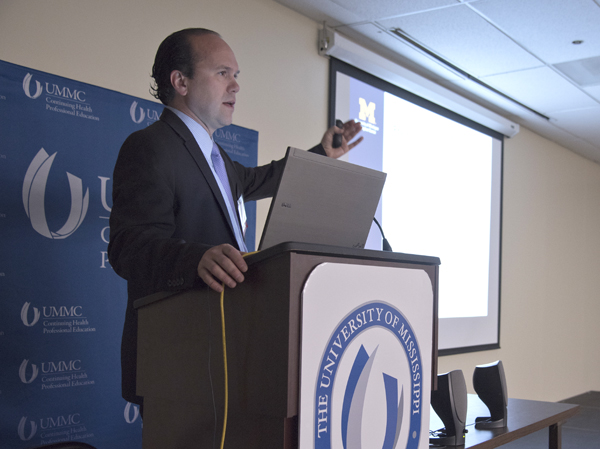Addressing frailty enhances transplant success

Patients who are in end-stage liver disease and hoping for a transplant are often weakened, malnourished, losing weight, easily fatigued, and have a diminished quality of life.
In the transplant world, they're experiencing “frailty.” But when it comes to deciding who should get a transplant and who should not, and who might be a better bet for doing well after surgery and who might not, should frailty be a top consideration?
And can frailty be fixed?
“One thing we've learned, which is not too surprising, is that frail patients are more likely to have complications, such as bacterial or fungal infections, or the need for dialysis,” Dr. Christopher Sonnenday, head of the liver transplant program at the University of Michigan-Ann Arbor, told doctors, nurses and others in the transplant community taking part in the University of Mississippi Medical Center's 2015 Mississippi Transplant Symposium Oct. 15 at the Jackson Medical Mall.
“Frailty impacts their mental health and quality of life, but does it affect survival? It turns out that it does.”
Sonnenday shared findings of a study he began in 2009 exploring frailty in liver transplant patients that examined 843 patients that were referred for a liver transplant and enrolled in the study. Of that number, 457 were put on a transplant waiting list, and 161 ultimately received transplants.
The study showed that the most frail transplant candidates aren't necessarily the oldest. It showed that the frailest patients weren't necessarily the ones with the highest Model for End-Stage Liver Disease score, which is used to measure the severity of liver disease. A MELD of 6 is lowest; the highest is 40.
Frail patients aren't any more likely to reject their organs that those deemed not frail, he said. But, the study indicated that high frailty and a high MELD score can predict poor survival, Sonnenday said.
“So, how do we use that data?' he asked. “If they're frail and have a high MELD, should they be excluded? Or should their transplant be expedited?”
But, he said, there's another way to use frailty as a factor in liver transplant: To identify patients before surgery who need help with frailty, and then to get them that help. “The obvious question is - can we fix frailty?” he said. “Can we train patients to improve their frailty and suffer less adverse outcomes?”
Patients who know they're frail “sometimes ask before surgery, 'What can I do?'” Sonnenday said. “We rarely give them structured advice, and the likelihood of them doing something on their own is small.”
His studies show that through “prehabilitation” on the front end as opposed to only focusing on rehabilitation on the back end of surgery, frailty can be greatly diminished. It's the focus of a program at the University of Michigan's Transplant Center, and it has proven results, Sonnenday said. Pre-transplant patients deemed frail are helped before surgery to become more active, practice better nutrition, and are given emotional support. “They are paired with a coach, and their activity is tracked, their nutrition supplemented and their stress relief is supported,” he said.
As a result, he said, those patients often have a shorter hospital stay, are less likely to suffer post-surgery complications, and have an average $40,000 less in transplant and hospital costs. “We were able to increase their daily activity, including increasing their walking distance,” he said. “They kept a nutrition journal. We were impressed by their compliance.
“Probably the biggest factor here is that the patients love it,” Sonnenday said. “They all said it was a positive interaction for them, and that it was an improvement in their care. They felt more motivated, and thought it increased their well-being.”
Prehabilitation doesn't stop with the surgery, he cautioned. “We can't take our foot off the gas,” Sonnenday said. “It needs to be ongoing. In some patients, you have serial frailty. After surgery, some get less frail, but some don't.”

“The recognition of frailty and how it affects transplant candidates is a relatively new concept. However, it is critically important to understand,” said Dr. Christopher Anderson, chair of the Department of Surgery and medical director of the Medical Center's abdominal transplant program. “Concepts like this help us develop better strategies to both select and prepare patients for transplantation.”
Anderson, the faculty activity director for the symposium, shared with participants UMMC's journey to bring back its liver transplant program after a 23-year hiatus. The revival began with south Jackson resident Karen Battle's liver transplant in March 2013. Since then, he said, 65 people have gotten liver transplants at UMMC. Thirty-five percent of that number are African-American, and 65 percent are male, Anderson said.
That minority representation “is significantly higher than in the rest of the Southeast and the nation,” Anderson said. “A disparity in transplant access existed, and to a degree, still exists in Mississippi. We will address that and improve on it through expansion of our program. That's our mission.”


